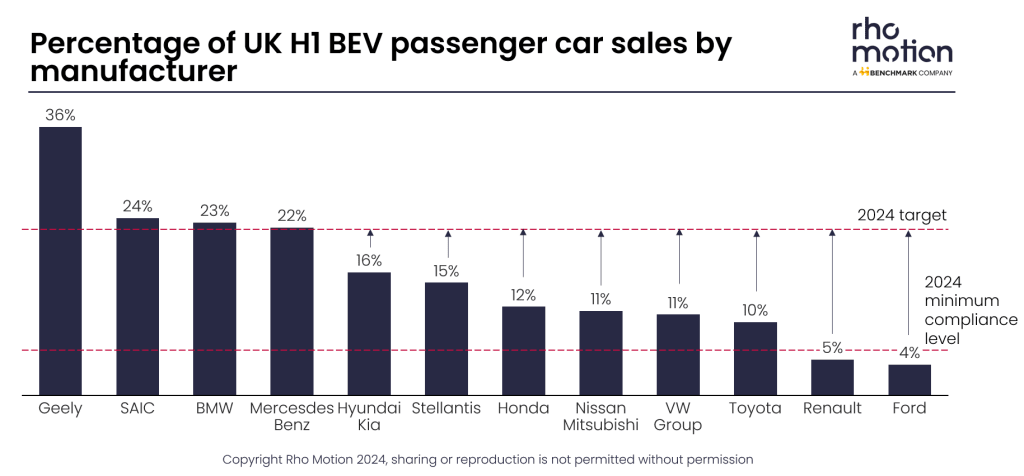As of January 2024, automakers operating in the UK have been required to ensure that 22% of vehicle sales this year are zero emission vehicles (ZEVs). This is part of the UK government’s plan which aims for all new cars and vans sold to be 100% electric by 2035. However, Rho Motion’s analysis reveals that only a limited number of OEMs are currently on track to meet this target. This development follows confirmation from the Department for Transport that the new Labour government intends to reinstate the original 2030 ZEV mandate target after it was delayed in September 2023.

H1 sales only a few OEMs are on track
In the first half of the year, only a few manufacturers, Geely, SAIC, BMW, and Mercedes Benz, managed to reach the required sales split for ZEVs. In contrast, major automotive companies such as the VW Group and Stellantis were trailing behind.
The current framework is designed with some flexibility, it allows manufacturers to trade ZEV credits among themselves as well as either borrowing from or crediting their sales against their future targets if they exceed or fall short of the mandate. There is, however, a minimum in-year compliance level of 6% for 2024.
Risk of non-compliance and potential fines
Ford and the Renault Group are particularly close to missing this compliance level, potentially exposing them to significant fines. From 2025, the required percentage of ZEV sales is set to rise to 28%, with a minimum compliance level of 14%. Manufacturers that fail to meet the compliance levels or do not sell enough ZEVs face penalties of GBP15,000 (USD19,990) for every non-ZEV unit sold over the mandated allowance.
OEM reactions
The mandate has faced scrutiny, with concerns about the potential impact on vehicle supply. Several manufacturers, including Ford, Stellantis, and VW, have indicated that to meet the ZEV targets, they may limit the availability of ICE vehicles rather than actively promoting BEV sales. This strategy could reduce the overall number of vehicles sold.
The automotive industry, including OEMs and vehicle sellers, has urged the government to introduce measures to support electric vehicle adoption, such as subsidies. If current trends persist, it appears likely that most OEMs will struggle to meet the mandated targets.
READ: Europe’s automotive industry calls for a delay of the 2025 CO2 targets
BEV sales in the context of the UK market
To date, BEVs account for 15% of total vehicle sales in the UK. However, when including PHEVs, this figure increases to 22%. PHEVs have experienced a resurgence in popularity throughout 2024, which may be affecting OEM BEV sales performance.
Details regarding the reinstated 2030 ZEV mandate remain limited, but it is anticipated that allowances for HEVs and PHEVs will be included, reflecting evolving market conditions.
More information
For more information about the EV market see our research or get in touch.
Image Credit: Adobe Stock

 Back to News
Back to News